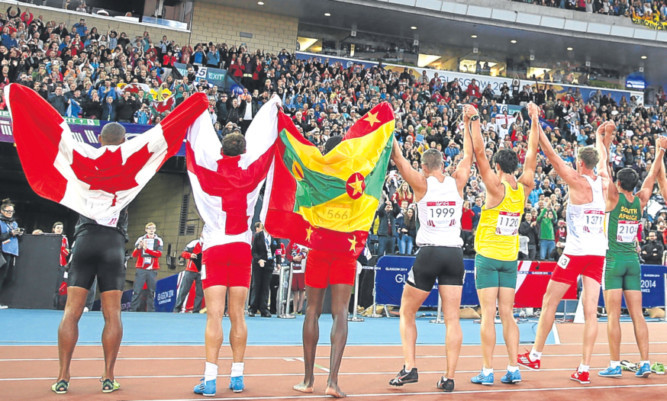
Former city Lord Provost Dr Michael Kelly was instrumental in the city’s adoption of the Glasgow’s Miles Better campaign and slogan. Here he gives his own deeply-engaging take on a Games that have shown us not just the best of Scotland, but the best of Britain:
Well, Glasgow did it.
Over the last 11 days the city has provided a glowing welcome for the Commonwealth and a platform for the Scottish team’s best-ever performance. Television has shown our city at its stunning best, highlighting the huge changes that have taken place and the pride Glaswegians take in showing them off.
Did anyone ever doubt that Glasgow could pull it off? Yes, a few were afraid that the city might blow its big opportunity on the world stage. And the first cringeworthy 15 minutes of the Opening Ceremony appeared to confirm our worst fears. Karen Dunbar does not represent the image Glasgow wants to show the world. But after that interminable quarter of an hour, when the people of Glasgow took over the city really put her best foot forward. The venues are world-class, the logistics of managing the athletes and the crowds have gone smoothly and the atmosphere has been brilliant.
But this is no one-hit wonder. We can look forward to bigger and better years to come. This summer has just been the start with the coming together of long term plans to restore Glasgow’s place in the sun. It’s taken a long time for us to get here. When I launched the Glasgow’s Miles Better campaign in 1982 Glasgow’s image was the pits.
Yet, after that challenging slogan that claimed Glasgow had plenty to offer, the city slowly began to turn itself around. We won the Garden Festival in 1988 and the title of European City of Culture in 1990. These attracted visitors who began to spread the good news that Glasgow was, indeed, worth a visit. That gave the city the confidence to believe that it could create a viable leisure industry.
That then led to public investment in essential facilities which make up the complex we now see on both sides of the Clyde. It encouraged private firms to build five-star hotels and open the bars and restaurants that make up Glasgow’s famous nightlife.
It gave us the most vibrant shopping in the UK outside of London. So, seven years ago we could show that we had both the infrastructure and the confidence to compete for the biggest prize in the Commonwealth.
This is just the beginning. There will be even bigger benefits to come to Glasgow in the future if the key objectives of reviving our dying East End are achieved. As soon as the Games were secured the council set up Clyde Gateway to co-ordinate the housing, the jobs and the apprenticeships necessary to regenerate this whole community.
Much of the new infrastructure built for the Games, like the new roads and the Athletes’ Village, will be at the heart of this progress. Already unemployment rates there are tumbling and 20,000 new jobs will be located in that neglected part of the city.
Glasgow deserves these benefits. We have fulfilled our promises to the organisers of the Games and to the Commonwealth.
These Games have been avowedly non-political. Yet they have perhaps delivered the most fundamental political statement of all. We have rediscovered something about ourselves: we are comfortable with our neighbours in the United Kingdom.
Before the Games there were fears that English competitors might be booed. Instead, the efforts of their medal winners have been cheered as loudly as the Scots’. How can you taunt your friends and relatives?
The Games, which paradoxically divide the UK in to different teams, have in fact emphasised our unity. We have realised that we share the same values: humour, personality. The Glasgow people were superb.
But so were the people of Manchester when they hosted the 2002 Games. And the atmosphere in London during the 2012 Olympics was just as good as here. The benefits of our Union are largely intangible. But for a few brief days we managed to touch them.
Maybe it was the fact that instead of being confronted with media constructs from Eton with Oxford accents we met ordinary English people who are not talking down to us. They love us. Maybe it was the English athletes talking about Glasgow as ‘home’ ground and Hampden filled with a ‘home ‘crowd. That made me proud.
Maybe it was hearing the athletes mentioning training together for these events and planning to work together as a Great Britain team for the Rio Olympics. That emphasised the value of togetherness. Maybe it was just hearing the term ‘home nations’ as success poured in upon success.
Glasgow is going to inherit a glittering legacy from the Games. Praise for a job well done, the opportunity to continue to attract the flagship events so important to our international reputation and long term employment for the people of the East End.
As the sparkling Games end, we are forced back to the mundane but vitally important constitutional argument. When the referendum result confirms our desire for unity, commentators might well remark; ‘You know, it was the Games that swung it’.”
Dr Kelly was Lord Provost from 1980 to 1984 and Rector of Glasgow University from 1984 to 1987. He is now a writer and PR consultant.

Enjoy the convenience of having The Sunday Post delivered as a digital ePaper straight to your smartphone, tablet or computer.
Subscribe for only £5.49 a month and enjoy all the benefits of the printed paper as a digital replica.
Subscribe